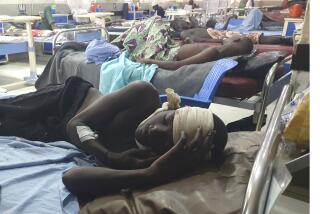Somalia Leader Survives Attack
- Share via
MOGADISHU, Somalia — The transitional president of Somalia narrowly escaped assassination Monday when a car bomb exploded as he left a converted grain silo that serves as the nation’s makeshift parliament.
President Abdullahi Yusuf was unharmed. However, eight other people, including his brother and several security guards, were killed by the blast in Baidoa, the nation’s provisional capital.
The attack marked the second consecutive day of bloodshed in the Horn of Africa nation, which has been without a functioning government since 1991. On Sunday, gunmen in Mogadishu shot to death an Italian nun and her bodyguard outside a children’s hospital.
Despite years of instability and violence, car bombs have been rare in Somalia, and local officials quickly blamed foreign militants. One government minister described the bombing as an “Al Qaeda-type” attack. No one immediately claimed responsibility.
“We hear about this type of thing in Iraq, but not Somalia,” said Abdul Fatah Ibrahim Rasheed, a member of parliament. “This is something that is very new for us.”
The blast came at a particularly sensitive time for the government. Yusuf’s administration is attempting to negotiate a power-sharing agreement with the Conservative Council of Islamic Courts, which seized control of Mogadishu earlier this year. Some officials in Baidoa accused the group of participating in the attack.
“It will jeopardize the peace process if it becomes very obvious that the Islamists are behind this terrorist act,” Foreign Minister Ismail Hurre Buba Hurre said during a visit to Nairobi, the Kenyan capital.
Islamist officials denied any knowledge of the attack.
“We know nothing about it, but we are very sorry for anything that hurts the security of Somalia,” said Sheik Mukhtar Robow, deputy security chief for the courts council, an alliance of religious leaders formed in an attempt to bring order to Mogadishu.
Both sides are to meet again in Khartoum, the Sudanese capital, next month to continue negotiations.
Witnesses said the bomb, apparently hidden in a small car outside the parliament compound, detonated as the president’s motorcade was leaving the facility. Yusuf had just addressed lawmakers, urging them to put aside their differences and endorse his newly reshuffled Cabinet.
There were conflicting reports about whether the car was parked or was driven by a suicide bomber. In a radio address Monday night, Yusuf said authorities had recovered the remains of a person they believed might have been the suicide driver.
The blast ignited at least seven other cars and flung wreckage more than 100 yards to the doorstep of the parliament building, witnesses said. Inside, panicked lawmakers screamed and fled the building. Security guards fired into the air, adding to the sense of chaos, witnesses said.
“We thought we were under attack,” said Ahmed Omar Gagale, a member of parliament. “It sounded like mortars, especially when some of the other cars began to explode from the fire.”
After its formation at an internationally sponsored conference in 2004, the transitional government opted to reside in Baidoa rather than Mogadishu because of violence in the nation’s traditional capital.
Since Islamists drove out the warlords who had carved up control of the city, security in Mogadishu has improved dramatically, while bloodshed in Baidoa has been rising. In July, gunmen shot a government minister as he left a mosque in Baidoa.
“It’s getting very scary there,” said Asha Ahmed Abdalla, a member of parliament.
Prime Minister Ali Mohammed Gedi escaped two assassination attempts in 2005.
*
More to Read
Sign up for Essential California
The most important California stories and recommendations in your inbox every morning.
You may occasionally receive promotional content from the Los Angeles Times.













